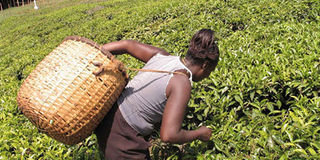Breaking News: Maai Mahiu tragedy: Death toll rises to 45
Review tea regulations to protect farmers

A tea picker in Nyeri. Tea is a labour-intensive product; labour accounts for half the cost of production. PHOTO | FILE | NATION MEDIA GROUP
What you need to know:
- Small-scale growers produce most of the tea but receive low and fluctuating prices for their produce, and are the most vulnerable in supply chains controlled by large firms.
- Tea farmers should be protected from an unpredictable market, ensuring they get prices that cover their high costs.
The Agriculture and Food Authority has called for public comments on proposed regulations under the Crops Act 2013.
The regulations impose enormous obligations of registration, licensing and criminal penalties to tea growers, manufacturers, dealers, brokers and so on, who are, in essence, dealing with their private property, without any corresponding responsibilities assumed by neither the national nor county government.
And they are unconstitutional. First, they were made under a national legislation that purports to regulate the growth and development of agricultural crops under the 4th Schedule of the Constitution, which restricts the role of national government to formulation of policy.
Secondly, they place an unnecessary burden on the right to private property. Regulation of land use and private property under the Act can only be justified under Article 66(1) of the Constitution.
SMALL-SCALE FARMERS
Section 4(d) of the Act states that in the management and administration of agricultural land, the national and county governments shall be guided by Article 6(2) — the powers of the State to regulate “use of any land in the interest of public order, public morality, public health and land use planning”.
It is unclear how that applies to farming of tea on private land.
The proposed Section 4(3) states that “no grower shall sell green leaf to any person other than to the manufacturing factory where they are registered”.
But few clerks and trucks lead to poor services at tea collection centres; some leaf is uncollected and the farmer loses time and potential income.
Small-scale growers produce most of the tea but receive low and fluctuating prices for their produce, and are the most vulnerable in supply chains controlled by large firms.
PRICING
Tea is a labour-intensive product; labour accounts for half the cost of production.
Farmers undertake physically demanding tasks, often enduring exhaustion and exposure to chemicals and the elements. But they have no power over factory and company management on pricing.
Tea farmers should be protected from an unpredictable market, ensuring they get prices that cover their high costs.
The Kenya Tea Development Agency (KTDA) has weakened its supervision by farmers, leading to major compromises that have led to the growers’ exploitation through levies and fees and inflated project costs.
Farmers own the factories yet earn no dividend, even in a successful year of trading.
RESTRUCTURE KTDA
KTDA properties, like the multibillion-shilling high-rise building being put up in Nairobi’s city centre, do not benefit farmers.
The fertiliser prices imposed by the KTDA is perceived by farmers to be too high; it should be subsidised.
And then there is corruption as regards insurance; ‘doctored’ weighing scales; a mandatory 2kg deduction for the weight of every bag, which must hold a maximum of 16kg of green leaf, yet it is hardly half a kilogramme, and the weight of leaf is rounded downwards.
There is a need to restructure KTDA and review its contracts with farmers to reduce the 16 per cent levies and unregulated credit. They make farmers poor.
These issues, and more, should be tackled before implementing any new regulations as that will only add confusion in the sector.
Ms Chepkirui is a law student at Moi University. [email protected]




